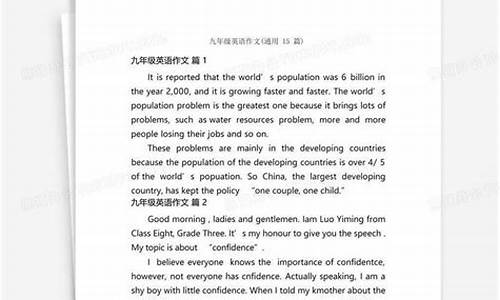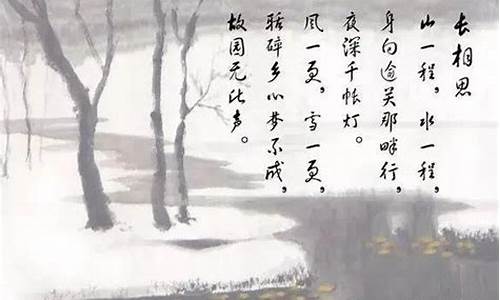您现在的位置是: 首页 > 句子大全 句子大全
九年级常用的英语句子有哪些单词_九年级常用的英语句子有哪些
tamoadmin 2024-09-27 人已围观
简介1.求新目标版本九年级英语Unit11、14、15三个单元课文中的重点句子 每个单元10个,要在课文中摘抄的哦2.九年级英语第二单元所有句子的翻译,和有哪些重点句子和词组3.人教版九年级英语知识点归纳20224.九年级英语unit13重点句子 短语5.九年级英语句子翻译6.人教版九年级英语语法整理新目标九年级英语知识点汇总九年级英语Unit11. by + doing 通过……方式 如:by
1.求新目标版本九年级英语Unit11、14、15三个单元课文中的重点句子 每个单元10个,要在课文中摘抄的哦
2.九年级英语第二单元所有句子的翻译,和有哪些重点句子和词组
3.人教版九年级英语知识点归纳2022
4.九年级英语unit13重点句子 短语
5.九年级英语句子翻译
6.人教版九年级英语语法整理

新目标九年级英语知识点汇总
九年级英语Unit1
1. by + doing 通过……方式 如:by studying with a group
by 还可以表示:“在…旁”、“靠近”、“在…期间”、“用、”
“经过”、“乘车”等
如:I live by the river. I have to go back by ten o’clock.
The thief entered the room by the window.
The student went to park by bus.
2. talk about 谈论,议论,讨论 如:The students often talk about movie after class. 学生们常常在课后讨论**。
talk to sb. === talk with sb. 与某人说话
3. 提建议的句子:
①What/ how about +doing sth.?
如:What/ How about going shopping?
②Why don’t you + do sth.? 如:Why don’t you go shopping?
③Why not + do sth. ? 如:Why not go shopping?
④Let’s + do sth. 如: Let’s go shopping
⑤Shall we/ I + do sth.? 如:Shall we/ I go shopping?
4. a lot 许多 常用于句末 如:I eat a lot. 我吃了许多。
5. too…to 太…而不能 常用的句型 too+adj./adv. + to do sth.
如:I’m too tired to say anything. 我太累了,什么都不想说。
6. aloud, loud与loudly的用法
三个词都与"大声"或"响亮"有关。
①aloud是副词,重点在出声能让人听见,但声音不一定很大,
常用在读书或说话上。通常放在动词之后。aloud没有比较级
形式。如: He read the story aloud to his son.
他朗读那篇故事给他儿子听。
②loud可作形容词或副词。用作副词时,常与speak, talk,
laugh等动词连用,多用于比较级,须放在动词之后。如:
She told us to speak a little louder. 她让我们说大声一点。
③loudly是副词,与loud同义,有时两者可替换使用,但往往
含有令人讨厌或打扰别人的意思,可位于动词之前或之后。如:
He does not talk loudly or laugh loudly in public. 他不当众大声谈笑。
7. not …at all 一点也不 根本不 如:
I like milk very much. I don’t like coffee at all. 我非常喜欢牛奶。我一点也不喜欢咖啡。
not经常可以和助动词结合在一起,at all 则放在句尾
8. be / get excited about sth.=== be / get excited about doing sth.
=== be excited to do sth. 对…感兴奋 如:
I am / get excited about going to Beijing.===
I am excited to go to Beijing. 我对去北京感到兴奋。
9. ① end up doing sth 终止做某事,结束做某事 如:
The party ended up singing. 晚会以唱歌而结束。
② end up with sth. 以…结束 如:
The party ended up with her singing. 晚会以她的歌唱而告终。
10. first of all 首先
. to begin with 一开始
later on 后来、随
11. also 也、而且(用于肯定句)常在句子的中间
either 也(用于否定句)常在句末
too 也 (用于肯定句) 常在句末
12. make mistakes 犯错 如:I often make mistakes. 我经常犯错。
make a mistake 犯一个错误 如: I have made a mistake.
我已经犯了一个错误。
13. laugh at sb. 笑话;取笑(某人) 如:Don’t laugh at me!
不要取笑我!
14. take notes 做笔记,做记录
15. enjoy doing sth . 喜欢做…乐意做… 如:
She enjoys playing football. 她喜欢踢足球。
enjoy oneself 过得愉快 如:He enjoyed himself. 他过得愉快。
16. native speaker 说本族语的人
17. make up 组成、构成
18. one of +(the+ 形容词比较级)+名词复数形式 …其中之一
如: She is one of the most popular teachers.
她是最受欢迎的教师之一。
19. It’s +形容词+(for sb. ) to do sth. (对于某人来说)做某事…
如:It’s difficult (for me ) to study English.
对于我来说学习英语太难了。
句中的it 是形式主语,真正的主语是to study English
20. practice doing 练习做某事 如:
She often practice speaking English. 她经常练习说英语。
21. decide to do sth. 决定做某事 如:
LiLei has decided to go to BeiJing . 李雷已经决定去北京。
22. unless 假如不,除非 引导条件状语从句
如:You will fail unless you work hard..假如你不努力你会失败。
I won’t write unless he writes first. 除非他先写要不我不写
23. deal with 处理 如:I dealt with a lot of problem.
24. worry about sb./ sth. 担心某人/ 某事
如:Mother worried about his son just now.
妈妈刚才担心他的儿子。
25. be angry with sb. 对某人生气 如:
I was angry with her. 我对她生气。
26. perhaps === maybe 也许
27. go by (时间) 过去 如: Two years went by. 两年过去了。
28. see sb. / sth. doing 看见某人正在做某事 强调正在发生
see sb. / sth. do 看见某人在做某事 如:
如: She saw him drawing a picture in the classroom.
她看见他正在教室里画画。
29. each other 彼此
30. regard… as … 把…看作为…. 如:
The boys regarded Anna as a fool. 这些男孩把安娜看成傻瓜。
31. too many 许多 修饰可数名词 如:too many girls
too much 许多 修饰不可数名词 如:too much milk
much too 太 修饰形容词 如:much too beautiful
32. change… into… 将…变为…
如:The magician changed the pen into a book.
这个魔术师将这本书变为一本书。
33. with the help of sb. == with one’s help 在某人的帮助下
如:with the help of LiLei == with LiLei’s help
在李雷的帮助下
34. compare … to … 把…与…相比
如:Compare you to Anna, you are lucky.
你和安娜相比,你是幸运的。
35. instead 代替 用在句末,副词(字面上常不译出来)
instead of sth. / doing sth. 代替,而不是 用在句中,动词
如:Last summer I went to Beijing. This year I’m going to Shanghai instead.去年夏天我去北京, 今年我将要去上海。
I will go instead of you. 我将代替你去。
He stayed at home instead of going swimming.
他呆在家里而不是去游泳。
求新目标版本九年级英语Unit11、14、15三个单元课文中的重点句子 每个单元10个,要在课文中摘抄的哦
不知道你是几年级的,是不是初三的,我就在这里说一下吧。
1.There be … . 2.IT is… 句型 3.I Found it difficult to do sth.(头重脚轻的宾语从句)就可以转换为第二种情况 4.if、whether引导的条件状语从句 5.表语从句:比如 the flower is beautiful . 6 so that (too …to)从句 意为太.…而不能 The women is so/too weak that she can't hand her hands up. 让步状语从句(由how、what、whatever=NOmatter、when、where等特殊疑问代词及疑问副词引导):NO matter how hard the work , is,he will solve the problem. 希望对你有所帮助。
九年级英语第二单元所有句子的翻译,和有哪些重点句子和词组
新目标英语九年级第十一单元重点句:
1. Could you please tell me where the restrooms are?
2. I prefer being outside.
3. There is always something happening.
4. Parents will spend many happy hours walking through the History Museum.
5.Could you please tell me if there are any good museums in Newtown?
6. It’s important to use correct language.
7. Sometimes we might even need to spend some time leading in to a question or request.
8. Take the elevator to the second floor.
9. I've been collecting them for many years.
10. The drugstore is between the furniture store and the bookstore.
第14单元知识重点句
1. Have you packed the camera yet?
2. He started telling me about all of the chores he had to do when he was a kid.
3. Be sure not to miss them if they come to a city.
4. Good luck to the New Ocean Wave.
5. It’s your job to wash the dished.
6. It’s your turn.
7. One more thing .
8.I have already watered them .
9. Not yet .
10. Sorry I couldn’t get back to you sooner .
第十五单元重点句:
1. We’re trying to save the manatees.
2. There used to be a lot of manatees.
3. In 1972, it was discovered that they were endangered.
4. I’m against building a new zoo in our town.
5. They provide homes for many endangered animals, and help to educate the public about caring for them.
6. They don’t have enough money to take care of so many fine animals.
7. I urge all of your readers to visit our wonderful zoo soon.
8. It’s hard to stop riding in cars.
9. She built herself a house out of trash.
10. The stuff used to be called trash.
11. Everyone calls him Mr Recycling.
12. It’s important to recycle paper to save the trees.
13. What are the things you are supposed to do?
人教版九年级英语知识点归纳2022
Unit2
我过去起床很晚。I used to get up late.
我习惯于早起。
I am used to getting up early.
等一会儿 wait a minute
你过去弹钢琴吗?
Did you use to play the piano?
我对学英语感兴趣。
I am interested in studying English.
她喜欢踢足球。I like playing .
我在游泳队。I am on the team.
我是游泳队的一员。
I am a member of the team.
人们确实改变。People sure change.
他过去害怕黑暗。
He used to be afraid of the dark.
害怕做某事 be afraid of doing sth
害怕做某事 be afraid to do sth
一个寂寞的男孩 a lonely boy
感觉寂寞 feel lonely
独自呆在家里 stay alone at home
坐飞机飞行 fly in an airplane
上飞机 get on the plane
下飞机 get out of the plane
在黑暗中 in the dark
在夜晚 in the evening
在一群人面前
in front of a group of people
睡觉时卧室的灯是开着的
go to bed with the bedroom light on
通过电视看比赛
watch the match on TV
蜘蛛和其他的昆虫
spiders and other insects
还有什么
what else / what other things
害怕体育课
be afraid of / be terrified of gym class
我不担心考试。
I don’t worry about the tests.
一直,总是 all the time
吃糖 eat candy
嚼口香糖 chew gum
我最大的问题就是我太忙了。
My biggest problem is that I’m too busy.
忙于做某事 be busy doing sth
忙于某事 be busy with sth
如此多的时间 so much time
如此多的规矩 so many rules
这些天 these days
直接回家 go right home
吃晚饭 eat dinner
花费时间/金钱做某事
(spend) spend time/money doing sth
在某事上花费时间/金钱
(spend) spend time / money on sth
做某事花费某人一些时间(take)It takes sb some time to do sth
eat 过去式,过去分词,现在分词 eat—ate—eaten --eating
不再 no longer / no more / not …any longer/ not …any more
整天 all day
和某人聊天 chat with sb
chat 过去式,过去分词,现在分词 chat—chatted—chatted—chatting
带我去音乐会 take me to concerts
我有做作业的时间
I have time to do my homework.
同义句 I have time for homework.
我有买车的钱
I have money to buy a car.
同义句 I have money for a car.
怀念过去的日子 miss the old days
在过去几年中我的生活改变很多。
My life has changed a lot in the last/ past few years.
在过去50年中中国发生很多变化。
Great changes have taken place in China in the last / past 50 years.
我的日常生活与你的不同。
My daily life is different from yours.
介意做某事 mind doing sth
你介意我在这吸烟吗?
Would you mind my smoking here?
我喜欢读漫画。
I like reading comics.
不要如此担心事情。
Don’t worry about things so much.
这会让你有压力。
It will make you stressed out.
我的朋友搬到另外一个城镇去了。My friend moved to another town.
受感动(两个)
be moved / be impressed
我把头发留长了。
I grow my hair long.
她似乎很年轻。
She seems to be young
同义句 She seems young.
同义句 It seems that she is young.
她似乎知道每件事。
She seems to know everything.
同义句
It seems that she knows everything.
一个十一岁的男孩
an eleven-year-old boy
支付。。。 pay for (pay--paid—paid)
我支付不起这个房子。
I can’t afford the house.
同义句
I can’t afford to pay for the house.
为他自己和家人惹麻烦 cause trouble / problems for himself and his family
陷入麻烦 get into trouble
处于麻烦中 be in trouble
摆脱麻烦 get out of trouble
对某人有耐心 be patient with sb
最后 in the end
做一个艰难的决定
make a difficult decision
决定做某事 decide to do sth
把他送到一个男子寄宿学校
send him to a boys’ boarding school
send 过去式,过去分词,现在分词 send—sent—sent—sending
使某人吃惊的是 to one’s surprise
那就是我确实想要的。
It was exactly what I needed.
即使他很穷,他也很快乐。
Even though he is poor, he is happy.
以。。。为骄傲 (两个)
take pride in / be proud of
他已经了两年了。
He has been dead for two years.
他两年前了。
He died two years ago.
他的让我们难过。
His death made us sad.
那条狗快了。The dog is dying.
注意你的发音
pay attention to your pronunciation
班级中最好的学生之一
one of the best students in the class
对自己感觉好
feel good about oneself
对某人来说做。。。是重要的。
It’s important for sb to do sth
在那里支持着他们的孩子
be there for their children
放弃做某事 give up doing sth
把它放弃 give it up
别浪费时间。Don’t waste time.
改变某人的想法
change one’s mind
正如Martin自己说的
as Martin himself says
他的妈妈尽可能好地照顾他。
His mother looked after him as much as she could.
和他妈妈的最近一次谈话
a recent conversation with his mother
改变某人的生活 change one’s life
画画 paint a picture
她过去恐高。
She used to be afraid high places.
你过去很矮,是不是?
You used to be short, didn’t you?
祝你学习进步,更上一层楼!(*^__^*)
九年级英语unit13重点句子 短语
人教版 九年级英语 知识点归纳2022有哪些你知道吗?阅读是 英语学习 的一个重要方面,阅读本事是从文字中获得信息的重要本事,也是中国人 学习英语 的最便捷的手段。一起来看看人教版九年级英语知识点归纳2022,欢迎查阅!
九年级英语知识点归纳
Could you please tell me where the restaurants are?
重点 短语
1.a
pair of 一对,一双,一副
2.between
A and B 在a和b之间
3.on
one’s / the way to 在去……的路上
4.pardon
me 什么,请再说一遍
5.pass
by 路过 经过
6.look
forward to 盼望 期待
7.excuse
me 打扰了 请原谅
8.get
some information about 获取有关……的一些信息
9.turn
left\right 向左\向右 转
10.go
past 经过 路过
11.a
little earlier 早一点儿
12.a
good place to eat 一个吃饭的好地方
13.in
different situation 在不同的情况下
14.on
time 准时 按时
15.get
to 到达
16.have
dinner 吃晚餐
17.on
one’s / \the right在右边
18.come
on 快点 请过来
19.the
shopping center 购物中心
20.the
corner of.......的角落/拐角处
21.lead
into 导入,引入
重点句型
1.问路常用的 句子 :
①Do you know where is … ?
②Can you tell me how can I get to …?
③Could you tell me how to get to …?
④Could/Will/Would you please tell me sth.表示十分客气地询问事情
Could you tell me how to get to the park?
请你告诉我怎么才能去邮局好吗?
2.decide
to do 决定做…...
She decided to go to have lunch.她决定去吃午餐。
3.Is
that a good place to hang out?
那是不是一个闲荡的好地方?
4.kind
of +adj/adv.“有点、一点”
She is kind of shy.她有点害羞。
5.prefer
动词,更喜欢、宁愿。 常用的结构有:
①prefer sth.更喜欢某事
I prefer English.我更喜欢英语。
②prefer doing/ to do 宁愿做某事
I prefer sitting/ to sit.我宁愿坐着。
③prefer sth to sth.同…相比更喜欢…...
I prefer dogs to cats.与猫相比我更喜欢狗。
④prefer doing to doing 宁愿做某事而不愿做某事
I prefer walking to sitting.我宁愿走路也不愿坐着
⑤prefer to do rather than do 宁愿做某事而不愿做某事
I prefer to work rather than be free.我宁愿工作而不愿闲着。
6.I'm
sorry to do sth.对做某事我觉得很抱歉、伤心。
新目标英语九年级知识
I think that mooncakes are delicious!
重点短语
1.put
on 增加(体重);发胖
2.care
about 关心; 在乎
3.end
up 最终成为, 最后处于
4.not
only ……but also……不但……而且……
5.shoot
down 射下
6.used
to do 过去常常做……
7.remind
sb.of 使某人想起
8.give
out 分发 发放
9.the
water festival 泼水节
10.the
Chinese spring festival 中国 春节
11.next
year 明年
12.sound
like 听起来像
13.each
other 互相 彼此
14.in
the shape of 以……的形状
15.on
mid-autumn night 在中秋之夜
16.fly
up to 飞向
17.lay
out 摆开 布置
18.come
back 回来
19.as
a result 结果 因此
20.Mother’s
day 母亲节
21.more
and more popular 越来越受欢迎
22.think
of 想起 ;认为 ;思考
23.dress
up 装扮 穿上盛装
24.the
importance of ……的重要性
25.make
money 挣钱
26.in
need 需要帮助 处于困境中
27.between
…and…在……和……之间
28.the
dragon boat festival 龙舟节
29.the
lantern festival 元宵节
30.like
best 最喜欢
31.go
to …for a vacation 去……度假
32.be
similar to 与……相似
33.wash
away 冲走 洗掉
34.Mid-autumn
festival 中秋节
35.shoot
down 射下
36.call
out 大声呼喊
37.the
tradition of ……的传统
38.at
night 在夜里; 在晚上
39.one…,the
other…一个……,另一个…...
40.Father’s
day 父亲节
重点句型
1.I
think that they’ re fun to watch.
我认为它们看着很有意思。
2.What
do you like about… ?
What do you like best about the Dragon Boat Festival?
关于 端午节 ,你最喜欢什么?
3.What
a great day!
多么美好的一天!
4 .1 wonder if…
I wonder if it’s similar to the Water Festival of the Dai people in YunnanProvince.
我想知道它是否与云南傣族的泼水节相似。
5.How+adj./adv.+
主 + 谓!
How fantastic the dragon boat teams were!
龙舟队多棒啊!
6.What
+ 名词+主语+谓语!
What an interesting book it is!
它是一本多么有趣的书啊!
初三英语怎么备考复习
一、听力
1、首先要充分利用好英语老师在课堂上的语言。一般的英语老师在英语课堂上都是尽可能地利用英语来组织教学,无论老师说多说少,同学们都可以把这当成练习听力的好机会。在听得不大明白的情况下,要仔细听上下文,从老师前后的语言中来猜测、判断语意,或是根据老师的手势、眼神、动作等来分析,千万不要因为听不大懂而放弃。如果能利用好老师的课堂上的语言,对你的听力会有不少的帮助。
2、在这一年里,充分利用国内或国外的优秀的英语广播和电视节目等,选择比较适合自己水平的节目,看比较简单的英语原声**等等。现在有很多电视频道和广播都有针对中学生开辟的栏目,同学们不妨每天定期收看,并作好听力记录,把能够听懂的东西记录下来,也可以把不明白的句子或单词记录下来(尽可能地记录),等节目结束后去揣摩或问老师。坚持下来,就会在无形中既提高了听的能力,还能有助于增长词汇量和知识,是帮助你打下牢固听力基础的较好 方法 ,并建立语言沟通能力和自信心的有效途径。
3、在泛听的基础上,必须安排一定的时间进行专项、综合和强化性听力训练。选择难易适度的材料,先易后难,先慢后快地进行。
4、注意做题方法。在做听力题时,一定要做到听前先把听力试卷全部看一遍,尤其是听对话和听短文这两种类型,以大概掌握主题内容,缩小听力范围;听第一遍时,不要急于做答,应仔细把全文听完,尽可能弄明白 文章 在讲什么;听第二遍的过程中,可以适当地做一些记录,如:时间、地点、数字、人物、天气等等,同时把可能正确的答案做上记号,以便听第三遍时检验核对。
二、阅读
1、提高阅读能力的最有效办法是进行广泛的课外阅读,选择不同文体和不同题材文章,培养自己的语感和良好的阅读习惯,丰富知识。制定切实可行的阅读计划,每天或每周几天都要坚持不懈地进行课外阅读。
2、重视阅读材料的选择。不单从兴趣出发,相反,有意识地读一些自己不甚了解,甚至不大感兴趣的科普、历史、哲学等方面的文章。另外,针对不同的训练目的,可以选取内容难度不同的阅读材料。例如,进行 快速阅读 时,可以选择生词量较小篇幅较短的文章;而重点在扩大词汇量、拓宽视野的阅读训练,就可以选择英文杂志或报纸。此外,还要注重循序渐进,根据不同阶段自己英语水平的变化选择相应的阅读材料。
3、进行有效的阅读方法训练。可以利用老师布置的阅读文段,也可以利用自己选择的文章来进行训练。同学们首先要善于培养自己对文章上、下文和指代关系的推理能力,要学会领悟词义及判断句子之间逻辑关系的能力以及抓住关键词语捕捉信息的能力。
4、阅读时不但要领会文章的意思,还要深刻理解文章的思想内涵,预测 故事 的结尾,对人物关系、人物品质以及事件发生的时间、地点、过程等做出准确的判断。
三、写作
英语写作 能力也是灵活运用知识的一种综合能力。
1、中国有句古话,叫“熟读唐诗三百首,不会吟诗也会作”。同样,要使自己具有较强的写作能力,首先应该熟读和背诵一些句型和短文。许多同学写出来的语言根本不符合英语的语言习惯,相当一部分人有对照中文逐字翻译的不良习惯,不去理会中英文的差异。大量的背诵和阅读是提高写作能力的有效办法,同学们若有大量的现 成语 言积累在脑海里,自己写起文段来,就可以做到脱口而出,或是模仿、套用,甚至发挥。
2、可以采用循序渐进、灵活多样的练习方式。从根据提示词写单句开始,到写单句,然后到写几句话,最后到写流利的文段。
3、尝试多种形式的写作,如短信、说明、通知、便条、明信片、看图写作、根据表格或记录写短文等。
4、在练习时,要充分了解所提供的情景素材,注意使用常见的连接词来表示顺序和逻辑关系,使句意表达连贯、语法正确、符合逻辑。还要注意字母的大小写和标点符号。
四、语言知识
听、说、读、写四种技能相辅相成,但是要想使这四种技能做到扎实严谨,少不了必须的英语语言知识。语言知识是英语的重要组成部分,是为听、说、读、写这四种能力服务的,是它们得以提高的有力保证。关于语言知识的学习,同学们可以尝试:
1、在现有知识的基础上,先亲自动手,对两年来教材中所要求掌握的基本语言知识先做一个系统的归纳,如时态、词类、简单句的结构以及一些常见的或重要的句型。在进行整理的过程中,切忌把语言现象作为孤立的语言来 总结 ,必须把他们放在语境和上下文中来体会和总结。例如在总结一般过去式时,不妨把你在教材中和平时的阅读中所见到的一般过去式的句子有选择地摘录下来,然后对他们的结构、用法和变化进行比较,最后你对一般过去式的理解就不会是机械的了。
2、在自己总结之后,对所学的语言知识有了一个自觉的回顾,但是由于同学们的 经验 和水平有限,肯定会有丢失和偏颇之处,因此笔者建议大家在随后的初三阶段选择一本适合初三学生阅读的语法书,边看边对照一下自己先前的总结,在得到系统、全面、正确的知识的同时,看看有那些是理解不当或是学过但已经遗忘的知识。
3、可以结合语法书,选做一些适合的语法练习,以加深和巩固语言知识。
4、适当而科学的语法练习是必要的,但是千万不能为了学语言而学语言,为了学语法而学语法,为了学词汇而学词汇,忽略了学习英语的目的是帮助自己更好地组织思想,更好地交流思想。同学们应该在了解语法的大体知识的基础上,尽快转到阅读、听力、口语、写作的学习上。一味地抠语法也是不可能学好英语的。
人教版九年级英语知识点归纳2022相关文章:
★ 八年级上册英语的教学计划仁爱版
★ 英语教师教学个人总结十篇
★ 英语教师2022新学期教学工作计划11篇
★ 八年级上学期的英语教学工作计划
★ 2022年初二政治下册知识点总结
★ 英语教师工作教学总结(通用10篇)
★ 人教版政治九年级知识点
★ 2022初中教师年度考核表个人总结精选10篇
★ 初中九年级英语知识点总结
★ 九年级寒假作业答案2022
九年级英语句子翻译
新目标英语九年级 Unit13短语,句子
1使(让)某人做某事 make sb do sth
2使某人开心(难过) make sb happy/sad
3整理床铺 make the bed
4取得进步 make progress
5如何挣钱 how to make money
6科学研究 scientific studies
7柔和的光线 soft lighting
8招待某人、为某人服务 serve sb
9播放很吵的音乐 play loud music
10参加大扫除活动 join a clean-up campaign
11拥挤的交通 heavy traffic
12使某人一直做某事 keep sb doing sth
13让你的肌肤丝绸般柔滑 make your skin silky soft
14遮阳 keep out the sun
15它不起作用。 It doesn’t work.
16曾经去过某地 have been to
17例如(二) for instance/for example
18攒钱 save money
19从飞机跳出来 jump out of a plane
20首先,作为开始 to start with
21给某人留张字条 leave sb a note
22毕竟 after all
23对某人生气(二) be annoyed with
24假装做某事 pretend to do sth
25有不同的品味 have different tastes
1、雨天使我很难过。 Rainy days make me sad.
2、吃饭时我喜欢听安静的音乐。
I like to listen to quiet music while I’m eating.
3、吵闹的音乐使我很不舒服。
Loud music makes me tense.
4、等她使我很生气。
Waiting for her made me angry.
5、吵闹的音乐使我想要跳舞。
Loud music always makes me want to dance.
6、以下是一些他们从科学研究学到的东西。
Here are some things they’ve learned from scientific studies.
7、像粉色和浅蓝一样的轻柔的音乐使人们放松。
Soft colors like pink and light blue make people relaxed.
8、许多快餐店用这种知识使顾客吃得更快。
Many fast food restaurants use this knowledge to make customers eat faster.
9、小饭店每天可以招待很多人。
Small restaurants can serve many people every day.
10、你认为一些饭店设计得很不舒适是公平的吗?
Do you think it’s fair that some restaurants are designed to be uncomfortable?
11、你对于污染问题有什么想法?
How do you feel about pollution?
12、在现代世界中,广告远处不在。
In the modern world, advertising is everywhere!
13、其他人讨厌广告,说它们使我们的城市和乡村看起来丑陋。
Others hate ads, saying that they make our cities and countryside look ugly.
14、很多广告特别针对于青少年。
Many ads are aimed specifically at teenagers.
15、可能收礼的艺术比送礼的艺术更难。
Maybe the art of receiving is even more difficult than the art of getting!
16、它们可能帮你对比两件不同的产品, 所以你可以买到你真正需要的那一个。
They can help you to compare two different products,so that you can buy the one you really need.
17、当价格列出时,你可以去价格最低的那家商店。
When prices are listed, you can go to the store with the lowest price.
18、广告也可以告诉你什么时候商店打折。
Ads also tell you when stores are having sales.
19、有时它们没有真的告诉你任何关于产品质量的问题。
They don’t really tell you anything about the quality of the products.
20、有时,广告可以引导你去买你根本就不需要的东西。
At times an ad can lead you to buy something you don’t need at all.
21、这件夹克衫不御寒。This jacket doesn’t keep out the cold.
22、努力学习英语可以使你找到一份好工作。
Working hard at English can lead to a good job.
23、收到钱使我很不舒服。
Receiving money makes me uncomfortable.
24、许多书写过关于“送礼的艺术”。
May books have been written about “the art of giving”.
25、他给我买了一件我不想要的礼物。
He buys me a gift that I don’t want.
26、我认为给别人买衣服或者其他私人用品很难。
I think it’s hard to buy clothes or other personal things for people.
27、为了使事情容易些,一些人宁愿只送钱。
To make things easier, some people would rather just give money.
28、在一些文化中,收钱可以使人们不舒服。
In some cultures, however, receiving money can make people uncomfortable.
29、我宁愿收到背后有某种含义的礼物。
I prefer to receive a gift that has some thought behind it.
30、不同的人对于这个话题有不同的想法。
Different people have very different thoughts on this subject!
人教版九年级英语语法整理
1、Tom开着灯睡觉,真是愚蠢。
It's so stupid that Tom sleeps with the lights on
2、Mary带给我一张便条,上面写着祝你好运。
Mary gives me a note, which writes "good luck to you" on it.
3、你最好不要担心他,他不再是个小孩子了。
You'd better not worry about him, he is no longer a child.
4、我姐姐担心不能控制这台电脑。
My sister worry that she can't control the computer.
5、我感觉越来越饿了,有什么吃的吗?
feel more and more hungry, is there anything to eat?
6、据说不同的星座有不同的标志。
It is said that different constellations have different
signs.
7、这个由他写的十二生肖的故事,相当有趣。
The Story of Chinese Zodiac written by hem is quite interesting.
8、看过今天的报纸了吗?看过,在办公室里看到的。
Have you seen today's newspaper? Yes, I saw it in the office.
伟大的成绩和辛勤劳动是成正比例的,有一分劳动就有一分收获,日积月累,从少到多,奇迹就可以创造出来。下面给大家带来一些关于人教版 九年级英语 语法整理,希望对大家有所帮助。
人教版九年级英语语法1
介词by的用法
1. 意为“在……旁”,“靠近”。
Some are singing and dancing under a big tree. Some are drawing by the lake.
有的在大树下 唱歌 跳舞。有的在湖边画画儿。
2. 意为“不迟于”,“到……时为止”。
Your son will be all right by supper time.
你的儿子在晚饭前会好的。
How many English songs had you learned by the end of last term?
到上个学期末你们已经学了多少首英语歌曲?
3. 表示 方法 、手段,可译作“靠”、“用”、“凭借”、“通过”、“乘坐”等。
The monkey was hanging from the tree by his tail and laughing.
猴子用尾巴吊在树上哈哈大笑。
The boy’s father was so thankful that he taught Edison how to send messages by railway telegraph.
孩子的父亲是那么的感激,于是他教爱迪生怎样通过铁路电报来传达信息。
4. 表示“逐个”,“逐批”的意思。
One by one they went past the table in the dark.
他们一个一个得在黑暗中经过这张桌子。
5. 表示“根据”,“按照”的意思。
What time is it by your watch?
你的表几点了?
6. 和take , hold等动词连用,说明接触身体的某一部分。
I took him by the hand.
我拉住了他的手。
7. 用于被动句中,表示行为主体,常译作“被”、“由”等。
English is spoken by many people.
英语被许多人说。(即“许多人讲英语。”)
人教版九年级英语语法2
动名词(doing)
动名词相当于名词,在 句子 中可以做主语、宾语、表语、定语等。
1. 作主语
Fighting broke out between the South and the North.
南方与北方开战了。
2. 作宾语
Would you mind turning down your radio a little, please?
请问你介意调小一点收音机的音量吗?
3. 作表语
Babysister’s job is washing,cooking and taking care of the children.
保姆的工作是洗衣服,作饭和照看孩子。
4. 做定语
a washing machine 一台洗衣机
人教版九年级英语语法3
used to 的用法
used to 意为过去常常做某事。
used to 的用法
1. 肯定句:used这个词没有人称的变化,to后面接动词原形。
否定句是didn’t use to….
When I was a child, I didn’t use to like apples.
当我还是孩子的时候我不喜欢苹果。
疑问形式是Did you use to…?
Where did you use to live before you came here?
当你来这儿之前你住哪儿?
2. 含有used to 的句子的反意疑问句不要usedn’t + 主语,而用didn’t + 主语。
——He used to smoke, didn’t he?
——他过去常常吸烟,是吗?
Yes, he did./ No, he didn’t.
是的,他吸。/ 不,他不吸。
人教版九年级英语语法4
被动语态
被动语态由助动词be加及物动词的过去分词构成,助动词be有时态,人称和数的变化。被动语态的时态是由be的时态决定的,be是什么时态,全句就是什么时态,be动词后面的过去分词不变。
1. 各种时态的被动语态结构如下:
一般现在时的被动语态:主语+am / is / are (not)+过去分词
一般过去时的被动语态:主语+was / were +过去分词
现在完成时的被动语态:主语+have / has +been +过去分词
一般将来时的被动语态:主语+will +be +过去分词
过去将来时的被动语态:主语+would / should + be +过去分词
过去进行时的被动语态:主语+was / were + being +过去分词
过去完成时的被动语态:主语+had + been +过去分词
情态动词的被动语态:情态动词+be+过去分词
2. 被动语态的用法
(1)不知道或没有必要说明动作的执行者是谁,不用by+动作执行者 短语 。
Football is played widely all over the world.
全世界都广泛地踢 足球 。
(2)强调动作的承受者。
The bank was robbed yesterday afternoon.
昨天下午这家银行遭到抢劫。
(3)作客观说明时,常采用一种被动语态句型。
It is reported that about twenty children have died of flu in the USA.
据报道美国大约二十名 儿童 于流感。
3. 主动语态的句子变为被动语态的步骤
(1)把原句中的宾语变为主语
(2)动词改为被动形式,即be+过去分词
(3)原来的主语,如果需要的话,放在by后面;如果没必要,可省略。
人教版九年级英语语法5
虚拟语气
如果我们所说的不是事实,而只是一种假设、愿望、建议或是一种实现不了的空想就用虚拟语气。
注意:条件句分两种,真实条件句和虚拟条件句。只有在虚拟(非真实)条件句中,才用虚拟语气;而在真实条件句中,要用陈述语气.
请比较:
(1)If it is sunny tomorrow , we’ll go to the zoo.
如果明天天气好,我们将会去公园。
在这句话中,明天天气好是完全有可能实现的,并非虚拟、幻想,因此是真实条件句,在本句中,适用“主将从现。”
(2)If I were you , I would go at once.
如果我是你的话,我立刻就走。
在这句话中,条件句“如果我是你”,但事实上,我不可能成为你,这只是假设的情况,没有实现的可能。当条件实现的可能性很小,甚至可以说没有时,就需要用虚拟语气来表示。
虚拟语气表示和现在的事实相反,从句用一般过时,主句用 “should/would/could/ might +动词原形。例如 :
If I had time, I would go for a walk.
If I were invited, I would go to the dinner party.
If I won a million dollars in the lottery, I would put it in the bank.
If I were you , I’d wear a shirt and tie.
注意:在虚拟语气的句子中,be动词只能用were,不能用was。
人教版九年级英语语法6
must/might/could/can t
1. must
(1)must 表示主观看法,意为“必须”。
如:You must stay here until I come back.
Must I hand in my homework right now?
对must引导的疑问句,肯定回答为must,否定回答为needn’t 或don’t have to .
如:—Must I finish my homework?
—No, you needn’t.
(2)must也可以表示有把握的推测,意为“ 一定,肯定”,用于肯定句。
如: The light is on, so he must be at home now.
其否定形式mustn’t表示“禁止,不许”。
如:You mustn’t play with fire.
You mustn’t be late.
2. could
(1)can的过去式,意为“能、会”,表示过去的能力。
如:He could write poems when he was 10.
(2)could在疑问句中,表示委婉请求的语气,此时could没有过去式的意思。
如:Could you do me a favour?
—Could I use your pen?
—Yes, you can.(注意回答)
3. might
might为may的过去式。might表示推测时,表示可能性低于may(此时might没有过去式的意思),当请求讲时,比may的语气更委婉。
He is away from school. He might be sick.
Might I use your dictionary?
4. can
(1)表示能力,一般译为“能、会”,尤其指生来具备的能力。
如:She can swim fast, but I can’t .
(2)表示许可,常在口语中。
如:You can use my dictionary.
(3)表示推测,意为“可能”,常用于否定句和疑问句中,此时can’t译为“不可能”。
如:—Can the news be true?
—No, it can’t be our teacher. He is on a visit to the Great Wall.
人教版九年级英语语法7
定语从句
1. 定语从句的概念
在复合句中,修饰某一名词或代词的从句叫定语从句。被修饰的名词或代词叫先行词,引导定语从句的词叫关系词,定语从句一般放在先行词的后面。
2. 定语从句的关系词
引导定语从句的关系词有关系代词和关系副词,常见的关系代词包括that, which, who(宾格whom,所有格whose)等,关系副词包括where, when, why等。关系代词和关系副词放在先行词及定语从句之间起连接作用,同时又作定语从句的重要成分。
3. 定语从句的分类
根据定语从句与先行词的关系,定语从句可分为限制性定语从句及非限制性定语从句。限制性定语从句紧跟先行词,主句与从句不用逗号分开,从句不可省去。非限制性定语从句与主句之间有逗号分开,起补充说明作用,如省去,意思仍完整。
4. 关系代词的用法
(1)that 既可以用于指人,也可以用于指物。在从句中作主语、宾语或表语。作主语时不可省略,作宾语可省略。例如:
Mary likes music that is quiet and gentle.
玛丽喜欢轻柔的音乐。(that作主语)
The coat (that) I put on the desk is blue.
我放在桌子上的那件外套是蓝色的。(that作宾语)
(2)which用于指物,在句中作主语、宾语或表语。作主语不可省略,作宾语可省略。例如:
The building which stands near the train station is a supermarket.
位于火车站附近的那座大楼是一家超市。(作主语)
The film (which) we saw last night was wonderful.
我们昨天晚上看的那部**很好看。(作宾语)
(3)who, whom用于指人,who 用作主语,whom用作宾语。在口语中,有时可用who代替whom。who和whom作宾语时也可省略。例如:
The girl who often helps me with my English is from England.
经常在英语方面帮助我的那个女孩是英国人。(作主语)
Who is the teacher (whom) Li Ming is talking to?
正在与李明谈话的老师是谁?(作宾语)
4. 关系副词的用法
(1)when指时间,其先行词表示时间,when在定语从句中作时间状语。例如:
This was the time when he arrived.
这是他到达的时间。
(2)where指地点,其先行词表示地点,where在定语从句中作地点状语。例如:
This is place where he works.
这是他工作的地点。
(3)why 指原因,其先行词是原因,why在定语从句中做原因状语。例如:
Nobody knows the reason why he is often late for school.
没人知道他为什么上学总迟到。
人教版九年级英语语法整理相关 文章 :
★ 九年级英语语法知识点整理归纳
★ 人教版初中英语语法大全
★ 最新九年级英语语法知识点总结大全
★ 九年级英语语法知识点
★ 初三英语语法知识考点总结
★ 初中生必须掌握的9大英语语法汇总
★ 九年级英语十大必考语法点
★ 九年级英语十大语法考点
★ 初三英语九个语法知识点
★ 初三英语语法知识点集锦









